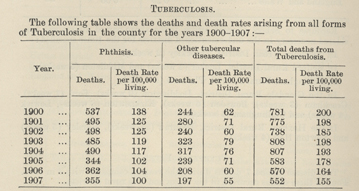|
Medical Officers of Health
Each local authority appointed its own medical officer of health to monitor the health of the local populace and the general sanitary conditions. The first Public Health Act of 1848 enabled towns to establish a local board of health and appoint a medical officer, but it wasn't compulsory at this time and so many didn't bother. It wasn't until 1870 that it became compulsory and so from the late 19th century onwards it is commonplace to find annual reports of the local medical officers of health. They would produce a report every year which provided statistical data on births, deaths, and contagious diseases as well as identifying particular sanitation problems in the area and explaining what had been achieved since the previous year. The reports were not always purely statistical and gave each individual medical officer an opportunity to express his opinion on the problems that had been found and provide an invaluable insight into the social conditions of the time.
Sometimes the individuals writing the reports recognise serious problems in public health that are not being addressed nationally and their frustration at the lack of power and resources to properly tackle the often dire situations is quite evident in the reports. The Northumberland County Medical Officer of Health was no different and expresses serious concerns in the face of the ever-growing problem of TB:
"Though it has been known for twenty-four years that Phthisis is an infectious, preventable, and in the early stages, a curable disease, and though the deaths from this disease have averaged during the ten years (1896-1905) 126 per 100,000 for England and Wales and for this county 123, no energetic action has been taken by sanitary authorities towards reducing the ravages from this disease. When the fact is realised that in the County of Northumberland one out of every 9 deaths is due to tubercular disease in one or other of its various forms and that these deaths exceed the sum of all those caused by all other infectious diseases, it is surely a matter for surprise that so little has been attempted in the direction of controlling and reducing the mortality from this cause."
J.W. Hembrough, 1906
|
|


Click Images to Enlarge
|